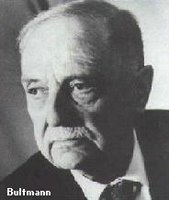 An interesting biography of Rudolf Bultmann:
An interesting biography of Rudolf Bultmann: How does one come to believe in the cross as the event of salvation? Bultmann argues, “Here there seems to be only one answer: because it is proclaimed as such, because it is proclaimed together with the resurrection. Christ the crucified and risen encounters us in the word of proclamation, and nowhere else. And faith in this word is the true faith of Easter” (Bultmann 1984, 39). God does not reveal himself in the documents of history which are limited by their historical context; instead the Word of God is to be identified with what meets us in the proclamation of Jesus Christ. Thus, there is something inherently mysterious in the Word of God, for there is no way to “objectify” it by putting it human language, even if that language is found in Scripture. Christian theologians can “abandon absolutely the search for the proof of the Word of proclamation, either external proof or proof within ourselves (in ‘experiences’)” (Bultmann 1969, 138).
It seems that we find here a separation of truth into the upper story of "faith or proclamation" from the lower story of facts and history. Christ is only to be encountered in an existential encounter, the Word of God is not to be identified with the historically-situated, human language in Scripture. This type of theological liberalism is not dead, but well and alive. We need to recover what CS Lewis called "true myth" - a biblical worldview that is comprehensive and all encompassing, true not only in private realms of meaning or myths, but also in public realms of history.
Comments